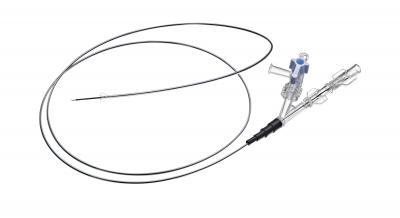
OffRoad CTO Device
October 11, 2013 – The Boston Scientific OffRoad Re-Entry Catheter System demonstrated excellent performance in facilitating the treatment of complete blockages in the major arteries that supply blood to the legs. These blockages, called chronic total occlusions (CTOs), are often associated with peripheral artery disease (PAD). The data from the Re-ROUTE clinical trial were reported in a late-breaking clinical trial session at the Vascular Interventional Advances Conference (VIVA) in Las Vegas.
In the Re-ROUTE trial, investigators were successful in navigating around challenging CTOs in the enrolled trial patients 84.8 percent of the time using the OffRoad device, exceeding the pre-specified trial goals.
"CTOs in the legs can lead to pain due to lack of blood flow. They also are an indicator of increased risk for major cardiovascular events and can lead to limb amputation and an overall diminished quality of life," said Dr. Andrej Schmidt, Parkhospital Leipzig, Center for Vascular Medicine, Leipzig, Germany, and principal investigator in the Re-ROUTE trial. "In my experience I found the OffRoad System to be a very effective tool for navigating around these challenging blockages, enabling me to treat more patients with peripheral artery disease."
The Re-ROUTE trial is a prospective, single-arm, non-randomized, multicenter (Europe and Canada), post-market study. Results were presented at VIVA 2013 by Dr. Koen Keirse, Regional Hospital Heilig Hart Tienen, Tienen, Belgium. Results included:
- Investigators achieved an 84.8 percent (78/92) technical success rate using the OffRoad System to cross CTOs in the femoropopliteal arteries.
- At 30 days post procedure, 75 percent of patients experienced an improvement of at least one category in the Rutherford classification, a six-stage scale commonly used to assess the severity of symptoms associated with PAD.
- A 3.3 percent device-related major adverse event rate was seen at 30 days, which is below the pre-specified trial goals.
The OffRoad Re-Entry Catheter System includes a balloon catheter with a micro-catheter lancet and is intended to help physicians navigate around complete arterial blockages that might otherwise prevent minimally invasive treatment. The system is designed to pass around the blockage by traveling within the tissue of the vessel wall (subintimal space). Once the catheter has passed the blockage, it re-enters the vessel lumen. A unique conical-shaped positioning balloon is used to expand the subintimal space and direct the micro-catheter lancet to re-enter the lumen. This allows the physician to position a guidewire across the occlusion and treat the blockage using traditional endovascular techniques such as angioplasty and stenting.
The OffRoad Re-Entry Catheter System has received CE Mark approval and is pending U.S. Food and Drug Administration 510(k) clearance. It is currently not available for sale in the United States and data from the Re-ROUTE trial supports U.S. regulatory submissions.
For more information, visit www.bostonscientific.com


 January 05, 2026
January 05, 2026 









